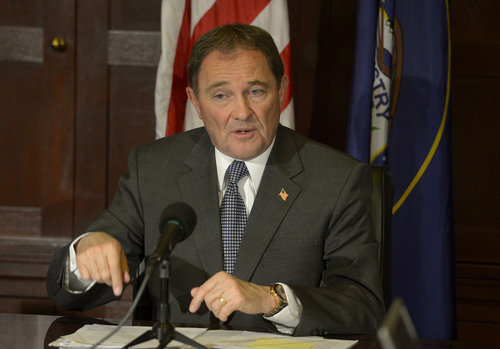This is an archived article that was published on sltrib.com in 2014, and information in the article may be outdated. It is provided only for personal research purposes and may not be reprinted.
Gov. Gary Herbert said Thursday he's confident Utah will be given wide latitude to provide health care to the state's poorest residents, and hopes to have an agreement with the Obama administration on a program by this summer.
"There's clearly a growing understanding in the Obama administration of the need for states to have more flexibility to be able to address their own unique demographics, address their own situations as opposed to a one-size-fits-all approach," Herbert said during his monthly KUED news conference Thursday.
"I feel very optimistic that, over the next few weeks and months, we're going to be able to bring reconciliation to this issue and bring a proposal to the Legislature that they will find acceptable," the governor said.
Herbert has proposed his "Healthy Utah Plan," which would tap $258 million in federal money to help low-income Utahns buy private health insurance — as opposed to putting them on Medicaid, as some other states have done.
The program hinges on waivers from the federal government and earlier this month the governor's senior advisers traveled to Washington to begin negotiating a solution that the Obama administration might find agreeable.
The governor will travel to Washington himself next month for further meetings on Utah's health proposal.
Herbert's plan would require an agreement to block grant funds to the state, but also would require participants in the program to pay part of their insurance premiums and copays. Both are areas that would have to be approved by the U.S. Department of Health and Human Services and are open to negotiation.
But Herbert said that, as time has gone on, the Obama administration has recognized a need to give more latitude to the states.
"The concept of maximum flexibility given to the states to develop their own program as an alternative to Medicaid expansion is one that seems to be acknowledged and understood in Washington now that hasn't been in the past," Herbert said. "So I think our timing is good on this."
RyLee Curtis, Medicaid policy analyst with the Utah Health Policy Project, said the White House had said all along that it welcomed proposals from states, but it wasn't until recently that the governor's office has come forward with its proposal.
"That's kind of on us that we haven't come up with a solution or a unique Utah option until now," she said. "At the same time, you have to give the governor credit because he could have just come out and said 'no,' as they did in states like Florida."
Curtis said while Utah is working on its plan, 60,000 impoverished Utahns — those making under $11,600 a year — are still without health coverage. She said she has talked to individuals who are rationing their medication, taking half doses to make it last longer, and others who are going to emergency rooms for care.
The governor's proposal to require Medicaid recipients to work may not pass muster, Curtis said.
A similar request by Utah to add a work requirement to Medicaid was rejected in 2011 and turned down more recently when Pennsylvania asked to have it included in that state's Medicaid expansion.
But if Utah can get what was approved for Arkansas — with money going to subsidize private insurance for the poor — plus a higher portion of federal dollars for the program like Iowa received, and any of the additional pieces Utah is asking for, then other conservative states might be willing to embrace Medicaid expansion.
Twitter: @RobertGehrke —
Vetoes
Gov. Gary Herbert said there are a handful of bills getting extra scrutiny as measures come across his desk and could ultimately end up being vetoed.
Herbert said he pays particular attention to bills that will require funding in future years or that might have unintended consequences.
He would not say which measures are getting heightened scrutiny or might be vetoed, explaining he wants to discuss matters with the bill sponsors before he acts.
In particular, he would not indicate what he would do with SB257, which creates a state-level process for reviewing school curriculum. The Utah State Board of Education, the PTA and others are urging Herbert to veto the bill, saying it takes the curriculum decisions out of the hands of local school boards.
The governor said he believes decisions regarding Utah's curriculum are at the local level, where they should be. While Indiana opted to reject the Common Core curriculum laid out by the federal government, Herbert said he believes Utah makes its own education decisions.
"The curriculum is controlled by Utah, make no mistake about it. It is now and always will be controlled by Utah," Herbert said. "That's part of our law."



